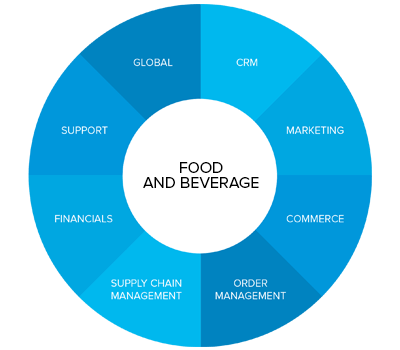Why Netsuite
For Food and Beverage
The Scalable Foundation for Modern Food and Beverage Companies
“Since we’ve had NetSuite we’ve really had improvements across a number of areas. It’s
not just a finance tool, but it’s got a customer service tool, it’s got a fixed asset module,
we’ve even got our payroll, as well as the manufacturing and the
warehousing and the finance systems all under one house.”
Seven Miles Coffee Roasters, NetSuite Customer Since 2015
Built for Food and Beverage
Order Management
They want it. You have it. They get it. Quickly and Profitably. Order fulfillment should always be that easy. NetSuite Advanced Order Management enables companies to capture this omnichannel experience quickly and profitably, delivering the perfect order every time with minimal effort by enabling you to fulfill orders anywhere, anytime so you can delight your customers with a satisfying shopping experience.

Supply Chain Management
Location irrelevance: the essence of supply chain management in the cloud is that the location a product is made in and who it’s made by are completely irrelevant. NetSuite offers the same control and real-time visibility over a global supply chain and related suppliers, contract manufacturers and vendors as if you were making the product yourselves in your own facility.
Financials
NetSuite’s financial management solution is used by thousands of organizations to manage their accounting needs. This software accelerates your financial close, provides strong expense management, offers streamlined and auditable revenue management and ensures complete real-time visibility into the financial performance of your food and beverage business. NetSuite financial management seamlessly integrates with all NetSuite order management, inventory, CRM and ecommerce functions to streamline critical business processes, enabling all employees to work from a single source of finance, sales and customer data.
Support
NetSuite’s integrated customer service management solution gives you a 360-degree view of customers, helping to improve customer satisfaction, attract new customers and lower service costs. Only NetSuite’s customer service solution gives everyone that interfaces with the customer—sales, support, service, and fulfillment—access to complete, key customer data in real-time, empowering them to better support your customers while driving upsell and cross-sell.
Global
NetSuite’s OneWorld solution addresses the complex multinational and multi-company needs of organizations. It enables businesses to adjust for currency, taxation and legal compliance differences at the local level, with regional and global business consolidation and roll-up. You get unprecedented visibility of your business worldwide in real-time, ensuring consistent, compliant management across the organization—locally and globally.
NetSuite’s cloud ERP system for the food and beverage industry offers a complete
solution that benefits your entire organization.
Optimized Supply Chain
Planning
Planning your supply chain is a delicate process of trying to balance demand and supply, potentially across the globe, in a way that provides your food and beverage company with the right combination of cost control, lead times and service level. NetSuite uses advanced inventory management and demand planning techniques to help you make the right decisions and increase your on-time delivery metrics. Each location where you store inventory can be set up with unique parameters to deliver unprecedented control over your supply chain.
Execution
Executing your supply chain plan is probably the most important phase and in a global economy, it can also be the most complex. When your manufacturing can take place on any continent and across multiple time zones, you need a simple but effective way to communicate with your distributors, partners, suppliers and contract manufacturers to make sure they know what you want, and you know what they are intending to deliver.
Collaboration
Being built in the cloud and accessible from anywhere on any device is vital to modern food and beverage businesses who manage supply chains of all sizes and complexities. NetSuite’s collaboration platform begins with automatic and instantaneous communication options via email, continues through the ability to provide portal access to your supply chain partners to view and update order or product information, and can mature to integrated system communication through web service or RESTlet APIs. Many customers build their own collaboration system on top of the NetSuite platform to fit their specific requirements.
Support
Supporting your customers throughout their journey with your products, especially when things don’t necessarily go as expected, is a critical part of developing relationships. The ability to enter, route, escalate and resolve issues is exactly what NetSuite’s case management system was designed to do. Cases can also launch sales orders to ship replacement units, coordinate with warranty claims and initiate a repair process when necessary.
See for Yourself Why 21,000+ Customers Use NetSuite
Streamlined Sales Cycles
CRM
NetSuite CRM delivers powerful capabilities that drive the complete customer lifecycle and strengthen customer relationships. NetSuite CRM provides a seamless flow of information across the entire customer journey from lead through to opportunity, sales order, fulfillment, renewal, upsell, cross-sell, and support. Unlike traditional CRM solutions, NetSuite CRM includes powerful sales performance management, order management and partner management capabilities.
Marketing
Many food and beverage companies still spend a majority of their marketing budget attending or participating in trade shows. Regardless of how you focus your marketing efforts, NetSuite has the core capabilities you need to manage the entire marketing process including the creation, execution and measurement of email campaigns. NetSuite’s marketing automation software enables you to generate highly qualified leads that are ready for sales engagement. It lets you track and measure a prospect’s activity, identifies when a lead meets known buyer-readiness conditions, and passes that lead to sales as soon as it meets your pre-defined criteria.
Commerce
Modern food and beverage businesses sell through many channels: B2B, B2C, etc. NetSuite’s core commerce capabilities have been designed specifically to quickly and easily allow your business to grow and expand sales through any channel. The same item that you create and enter on internal sales orders can be instantly published to your website with seamless control over pricing and promotions.




























